Why Are We All Posting the Viral Video of Kids Reacting to Gay Marriage?

I’ve often said that if I could just teach a Gender Studies 101 class to preschoolers the world would be a better place.
I’m kidding, sort of. But I did sit through most of the gender studies courses I took in college and thought, "If we could only get these ideas into everyone’s heads before they learn how to be sexist, how to be racist, how to be homophobic, maybe we could really start a revolution."
Though not everyone sees a group of kids and has a strong desire to sit down and show them the Feminist Ryan Gosling coffee table book or deconstruct Judith Butler’s Gender Trouble, children tend to make us hopeful because we view them as blank slates. They haven’t learned to be awful yet, so they are still good. They are kind.
They are the future and that means we’re all gonna be alright!
Or at least, that’s what the entire internet seems to have agreed, based on a video created by the award-winning Fine Brothers Production company (who are responsible for the "Kids React To" series) that captures kids between the ages of five and 13 reacting to the idea of same-sex marriage.
The 16-minute YouTube video, titled "Kids React To Gay Marriage," has gone viral and shown up on BuzzFeed, Huffington Post, Autostraddle, and Jezebel, to name a few. In turn, almost all of my friends have posted about the video on Facebook and Twitter.
Everyone is super happy. Huffington Post calls the video "both heartwarming and hopeful," while Jezebel jokes that "maybe Macklemore is doing some good!" and warns that the video "might make your ovaries explode." One of my friends posted the link to his Facebook and wrote, "I love kids." Another friend tweeted the link and added, "The next generation is gonna be alright."
None of this is wrong. In fact, I too found most of the kids in the video to be adorable, and it definitely did bring a smile to my face (though I do find it kind of odd that not many people are unpacking what it means that one of the youngest kids stubbornly repeats anti-gay sentiments — he may not necessarily know what he's talking about, but clearly someone in his life is influencing his perceptions and it's upsetting to think that he will grow up with that bias).
For the most part though, these kids are great. I’m a camp counselor, a tutor, and a babysitter. Like all my friends taking to social media to champion this video, I too love kids! I have worked with kids for more than a decade, and it is always gratifying to see very young people spouting knowledge and acceptance that at times seems to allude the older folks who are tasked with running the world until these wise youngins are old enough to take over.
But as I read all the enthusiastic, excited, and occasionally incredulous reactions to the video, I kept coming back to this question: What about us?
When I say "us," I’m referring most directly to the peers in my age-group, specifically millennials. And what I mean is: while it’s wonderful to see kids championing equality for all, we can’t just post this video to our Facebook profiles and act like they’ve got everything under control. While it’s reasonable to hope that future generations will fix some of the longstanding problems we have in our society with regard to oppression and intolerance, it’s not reasonable to absolve ourselves of responsibility in the meantime.
I don’t think anyone is purposefully doing that, but when we gush and coo over children spouting soundbites that I wish government officials would say, it’s easy to forget that we too are the youth.
There’s nothing wrong with enjoying the video, but once we’ve viewed it, let’s be sure we’re doing our part to make the world a good place to be now. It can be hard to truly look inside ourselves and examine our own language and our own prejudices. It's much harder to acknowledge all the ways in which we still need to change than it is to look at an uplifting video and say, "The kids are alright." But it's necessary.
Same-sex marriage is a good place to begin teaching kids about equality, but it’s by no means the final frontier. We could do well to remember that we're all just getting started.